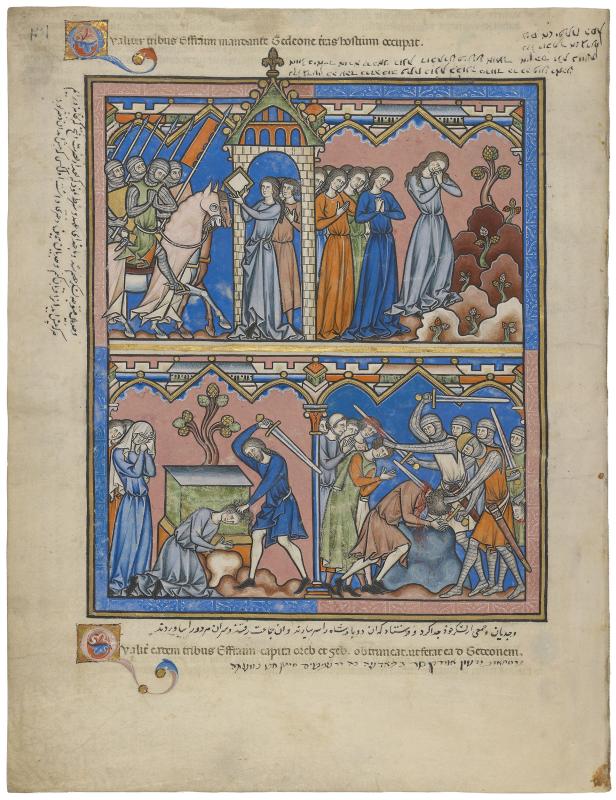
Jephthah's Despair, Mourning in the Mountains, Victory's Awful Price, A Treacherous Ascent
Old Testament Miniatures with Latin, Persian, and Judeo-Persian inscriptions
Purchased by J.P. Morgan (1867–1943) in 1916
Folio 13v (Latin)
Upper half: How, following Gideon’s order, the tribe of Ephraim takes possession of the enemy’s land. (Judges 7:24)
Lower half: How the same tribe of Ephraim cuts off the head of Oreb and Zeeb in order to bring them to Gibeon. (Judges 11:29–35)
Folio 13v (Persian)
Persian foliation: 31
Upper left margin: And Gideon turned to the army of the enemy and made a vow and a condition that, "When I return home after victory and conquest, I shall sacrifice whoever comes forth [first]. And Gideon had a daughter; the first person to come forth was that same daughter.
Lower half: Gideon chose a company out of his army and sent them to bring back the heads of those two kings; and that company went and brought both their heads.
Folio 13v (Judeo-Persian)
Upper left margin: The tale of Gideon who had vowed that if he won and came home, he would sacrifice whoever would come out to meet him first. His daughter came out to [meet] him.
Upper right & upper right margin: This was also written in error. It is not the tale of Gideon’s daughter but of Jephthah.
Lower half, beneath Latin: Gideon sends away for the heads of the two kings as it is written in Judges [chapter] 8.
Jephthah's Despair
Once more, the Israelites have forgotten the blessings of the Lord and turned to the worship of idols. The people are sold into the hands of the Philistines and the Amorites and remain enslaved for eighteen years. Jephthah, the son of Gilead, is selected by the elders to lead the people out of bondage. If the Lord will bring him victory over Ammon, Jephthah vows, he will offer as sacrifice the first to come forth from his house upon his return. After the victory, he returns home, only to be greeted by his daughter, who merrily plays a timbrel. (Judges 11:30–35)
Mourning in the Mountains
Although filled with dread and sorrow, Jephthah's daughter accepts the vow her father has made to the Lord. She requests only that she and several companions might be granted two months to lament in the mountains. (Judges 11:36–38)
Victory's Awful Price
Two months have passed, and Jephthah's daughter bravely returns so that her father might fulfill his vow. Before a group of grieving women and an altar, Jephthah prepares to sever the neck of his daughter, whose wrists have been bound. (Judges 11:39–40)
A Treacherous Ascent
Abimelech, one of Gideon's sons, desires to lead the children of Israel, but must contend with his seventy brothers, all equally entitled to Gideon's legacy. Abimelech is not a patient man; he hires a band of vagabonds and mercenaries and slays his brothers. As Abimelech severs the head of one brother, his companions attack the others. One of the mercenaries holds a gruesome trophy in one hand and a bloodied sword in the other. (Judges 9:3–6)
